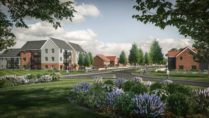Developing Brownfield Sites Conference
 Last week our deputy chairman, Nick Wood-Dow, chaired a Westminster Briefing on developing brownfield sites.
Last week our deputy chairman, Nick Wood-Dow, chaired a Westminster Briefing on developing brownfield sites.
The Government has recognised the need to encourage building. House prices are rocketing skywards and there is not nearly enough housing supply of the right type and in the right places to meet demand. As part of this recognition that we need to build more the Government announced its intention to grant automatic permission in principle on brownfield sites identified on brownfield registers. Sarah Fitzpatrick of legal firm Berwin Leighton Paisner was quick to emphasise that permission in principle is not planning consent and is also limited to the building of residential properties. This idea of permission in principle is currently being brought forward in the Housing and Planning Bill and will exist in some format when the Bill is given Royal Assent. Permission in principle is meant to act as a guarantee measure, offering certainty to developers at an earlier stage in the planning process, save them money and reduce the waste of unsuccessful applications.
Making brownfield sites easier to develop with fewer unsuccessful planning applications is meant to act as an incentive. Furthe rmore, the introduction of a Small Sites Register, which will identify small brownfield sites more quickly and show who owns these sites, adds to this incentive of developing previously developed land not just for larger developers but smaller ones as well. Mike Taylor of planning consultants, Chilmark Consulting, pointed out that local authorities will be responsible for compiling the brownfield registers and so will enable councils to reject sites which are not suitable for housebuilding.
rmore, the introduction of a Small Sites Register, which will identify small brownfield sites more quickly and show who owns these sites, adds to this incentive of developing previously developed land not just for larger developers but smaller ones as well. Mike Taylor of planning consultants, Chilmark Consulting, pointed out that local authorities will be responsible for compiling the brownfield registers and so will enable councils to reject sites which are not suitable for housebuilding.
These changes should theoretically make it easier for developers who want to re-develop brownfield sites. Supposedly, it will also protect greenfield sites, which by contrast will look more expensive and more difficult to develop.
Developing existing brownfield is appealing in principle. It acts in a natural and non-obtrusive way of protecting the countryside. More greenfield sites can supposedly be left out of development plans. Paul Miner from the Campaign to Protect Rural England, was supportive of these reforms which he believes will help protect Areas of Outstanding Natural Beauty, National Parks and also Greenbelt land.
However, there are simply not enough brownfield sites to develop to meet the housing demand and also office space demand. The number of first time buyers has decreased astronomically as house prices increased out of line with inflation. Additionally, we have to ask whether the brownfield sites i n question are even in the right places. Brownfield sites in Manchester cannot be used to meet housing supply in the South East, which is where significant pressure for new homes is a key issue for all local authorities
n question are even in the right places. Brownfield sites in Manchester cannot be used to meet housing supply in the South East, which is where significant pressure for new homes is a key issue for all local authorities
Therefore, whilst the principle of Brownfield First is good only developing brownfield does not solve the bigger problem we have to remember that we have a growing population which is living longer. This means that it is not viable to only develop brownfield land. Yes, greenfield sites should be protected, but in the context of a wider debate and planning strategy that enables the development of existing and new communities which provide a range of homes and housing tenure options.
Copies of the various presentations
Sarah Fitzpatrick | Berwin Leighton Paisner LLP | http://www.westminster-briefing.com/fileadmin/westminster-briefing/pastevents/Sarah_Fitzpatrick.pdf
Jamie Ratcliffe | GLA | http://www.westminster-briefing.com/fileadmin/westminster-briefing/pastevents/Jamie_Ratcliffe.pdf
Mike Taylor | Chilmark Consulting | http://www.westminster-briefing.com/fileadmin/westminster-briefing/pastevents/Mike_Taylor.pdf
Paul Miner | CPRE | http://www.westminster-briefing.com/fileadmin/westminster-briefing/pastevents/Paul_Miner_01.pdf
Stuart Reston | HSE | http://www.westminster-briefing.com/fileadmin/westminster-briefing/pastevents/Stuart_Reston.pdf
Mark Burrage | RSK Group | http://www.westminster-briefing.com/fileadmin/westminster-briefing/pastevents/Mark_Burrage.pdf
Fraser Wells | Durkan Estates | http://www.westminster-briefing.com/fileadmin/westminster-briefing/pastevents/Fraser_Wells.pdf

Strategic land and site promotion
“Chelgate gives a real insight into political thinking at all levels and all political persuasions, …

Energy and infrastructure
From new nuclear and unconventional gas to renewables, waste and airports, our team has worked …

